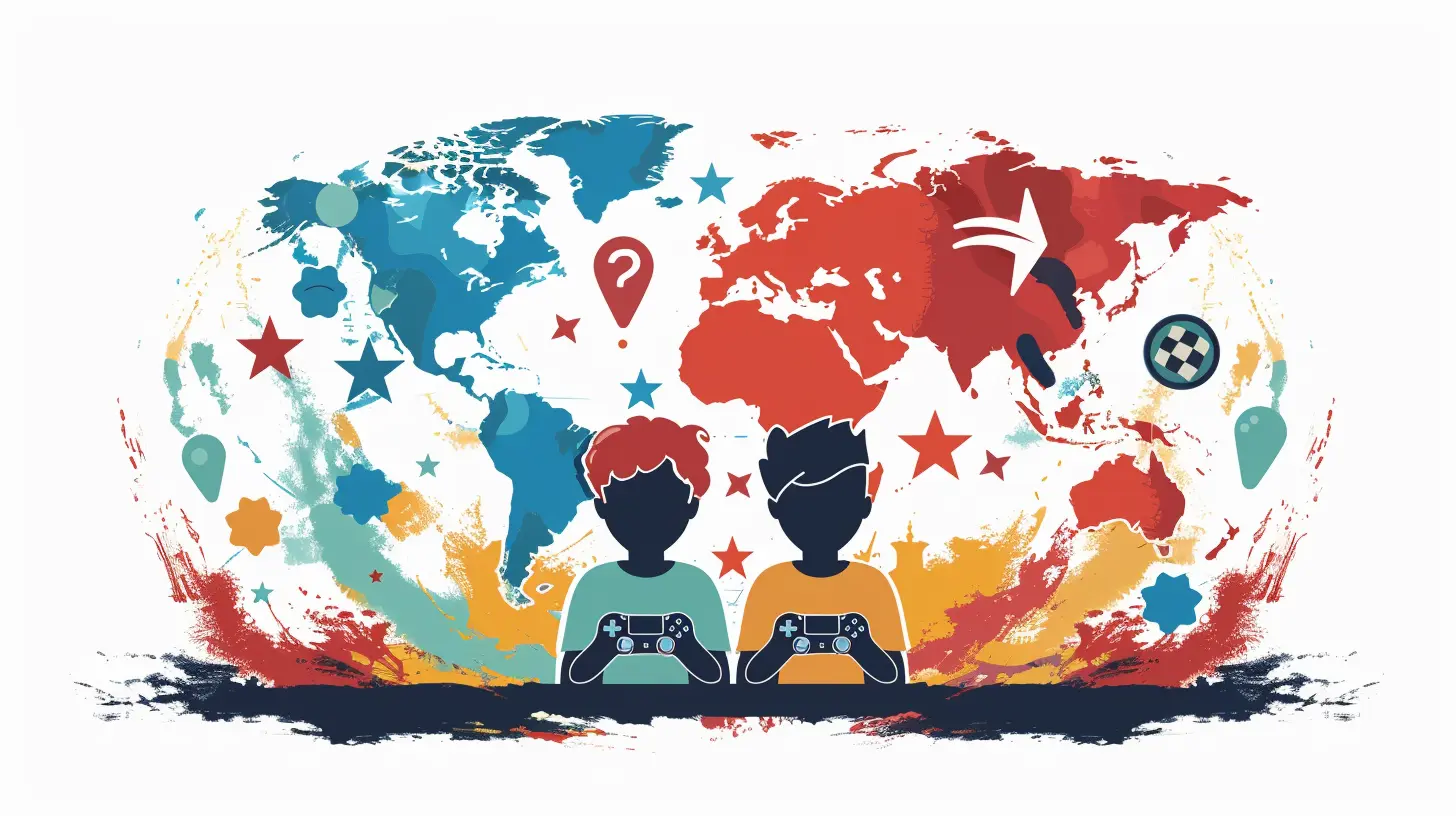The Importance of Cross-Cultural Collaboration in Esports
22 April 2025
In recent years, esports has exploded in popularity, becoming a global phenomenon that brings together gamers, fans, and organizations from every corner of the world. But there's one aspect of esports that often flies under the radar: the importance of cross-cultural collaboration. With players, teams, and even entire leagues spanning multiple continents, understanding different cultures and working together across boundaries is more crucial than ever.
So, why is cross-cultural collaboration important in esports? How does it affect teams, organizations, and the esports community as a whole? Let’s dive in and explore the answer to these questions—and more.

The Global Nature of Esports
Before we get into the nitty-gritty, let’s take a step back and recognize just how global esports really is. Unlike traditional sports, which may have regional leagues or limitations due to travel, esports transcends those barriers. You can have a team composed of players from South Korea, the United States, and Europe, all competing in the same tournament without ever leaving their homes.This global nature creates unique opportunities but also comes with its own set of challenges. On one hand, the ability to connect with anyone, anywhere, is a huge advantage. On the other hand, cultural differences can lead to misunderstandings, communication breakdowns, and even conflicts that can hinder team performance.
A Melting Pot of Cultures and Languages
Let’s be real—esports is a melting pot. You’ve got players speaking different languages, following different customs, and adhering to different social norms. While diversity is beautiful, it can also be tricky to navigate. A player from Japan may have a very different approach to teamwork than a player from Brazil, and if neither side knows how to bridge that gap, it could hinder their ability to work together effectively.Language barriers can also be a big issue. While English is often considered the “default” language of communication in global esports, not everyone speaks it fluently. Miscommunications due to language differences can affect everything from in-game strategy to team morale.
So, how can teams overcome these challenges and make the most of their diverse rosters? The answer lies in cross-cultural collaboration.

Why Cross-Cultural Collaboration is Essential
Building Stronger Teams
A team is only as strong as its ability to work together. When players come from different cultural backgrounds, understanding and respecting those differences is key to building cohesion and trust. Cross-cultural collaboration isn’t just about speaking the same language; it’s about learning to appreciate each other’s perspectives and finding common ground.Think about it like this: in a game like League of Legends, every player has a role to play. The same goes for a team’s cultural dynamics. Understanding how someone from another culture approaches teamwork or problem-solving can make a huge difference in how well a team functions. If everyone is on the same page, they’re more likely to succeed.
Enhancing Creativity and Problem-Solving
One of the biggest advantages of having a diverse team is the potential for creativity and innovation. Different cultures bring different ways of thinking, and when these perspectives are combined, it can lead to some truly unique approaches to strategy and gameplay.In esports, where the meta is constantly evolving, having a wide range of perspectives can give teams a competitive edge. For example, strategies that are commonplace in one region may be completely unheard of in another. By sharing and collaborating across cultures, teams can come up with new tactics that their opponents might not expect.
Improving Communication Skills
Effective communication is critical in esports, where split-second decisions can make or break a game. Cross-cultural collaboration forces teams to improve their communication skills—not just in terms of language, but also in terms of understanding non-verbal cues, tone, and context.By learning to communicate effectively across cultures, players can enhance their teamwork and coordination. This, in turn, leads to better in-game performance and a more cohesive team dynamic.
Boosting Emotional Intelligence
Working with people from different cultures isn’t just about improving communication or strategy—it’s also about developing emotional intelligence. When players are exposed to different viewpoints and ways of thinking, they become more empathetic and better able to navigate interpersonal relationships.In high-pressure environments like esports, emotional intelligence is a crucial skill. Teams that can manage their emotions, handle conflict, and support each other are more likely to succeed in the long run.
Expanding Fan Engagement
Cross-cultural collaboration doesn’t just benefit the players—it also benefits the fans. Esports has a massive global audience, and fans love seeing teams that represent a diverse range of cultures and backgrounds. When teams embrace cross-cultural collaboration, they’re more likely to attract a wider fanbase, which can lead to increased sponsorship opportunities and financial success.Plus, seeing players from different cultures working together can be incredibly inspiring. It sends a powerful message that esports is a space where anyone, regardless of where they come from, can succeed.

Challenges of Cross-Cultural Collaboration in Esports
Of course, cross-cultural collaboration isn’t always easy. There are definitely some challenges that teams and organizations need to be aware of.Language Barriers
We’ve touched on this already, but it's worth repeating: language barriers can be a significant issue in esports. Even when players speak the same language, there can still be misunderstandings due to differences in slang, accents, or cultural references.To overcome this, many teams invest in interpreters or language lessons for their players. But it’s not just about translating words—it’s also about translating meaning. Players need to learn how to communicate clearly and concisely, especially during high-pressure moments in-game.
Time Zone Differences
Time zones are another challenge that comes with the global nature of esports. Teams with players from different continents often struggle to find practice times that work for everyone. This can lead to fatigue, burnout, or even resentment if some players feel they’re making more sacrifices than others.To manage this, teams need to be flexible and willing to compromise. It’s also important for organizations to provide adequate support, such as mental health resources and time management tools, to help players balance their workloads.
Cultural Misunderstandings
Cultural misunderstandings are another common issue. What might be considered normal behavior in one culture could be seen as rude or disrespectful in another. For example, in some Asian cultures, it’s common for players to avoid direct eye contact as a sign of respect. However, in Western cultures, this could be interpreted as a lack of confidence or interest.To avoid these kinds of issues, teams need to invest in cultural sensitivity training. Players and coaches should be educated on the cultural norms of their teammates and learn how to navigate those differences. This not only improves team dynamics but also helps to foster a more inclusive and respectful environment.
Different Playstyles and Strategies
Different regions often have different playstyles, which can sometimes lead to clashes within a team. For example, South Korean teams are known for their highly disciplined, methodical approach to games, while North American teams might favor a more aggressive, risk-taking style.Finding a balance between these playstyles can be tricky, but it’s also one of the reasons why cross-cultural collaboration can be so valuable. By blending different approaches, teams can create a more versatile and unpredictable style of play.

How Teams Can Foster Cross-Cultural Collaboration
So, how can teams and organizations foster cross-cultural collaboration in esports? Here are a few key strategies:1. Invest in Cultural Sensitivity Training
As we mentioned earlier, cultural sensitivity training is essential for any team with players from diverse backgrounds. This training should cover not only basic cultural norms but also deeper topics like communication styles, conflict resolution, and teamwork.2. Encourage Open Communication
Teams should create an environment where players feel comfortable sharing their thoughts and concerns. This means encouraging open communication, both on and off the virtual battlefield. Regular team meetings, one-on-one check-ins, and team-building exercises can all help to foster better communication and understanding.3. Provide Language Support
If language barriers are an issue, teams should provide language lessons or hire interpreters to ensure that everyone can communicate effectively. This is particularly important for teams that compete internationally, where clear communication can be the difference between victory and defeat.4. Celebrate Diversity
Rather than seeing cultural differences as a challenge, teams should celebrate them. Whether it’s by learning about each other’s customs, sharing favorite foods, or even incorporating elements of different cultures into team branding, celebrating diversity can help to create a more inclusive and supportive team environment.5. Be Flexible and Adaptable
Finally, teams need to be flexible and adaptable. This means being willing to adjust practice schedules, strategies, and even team roles to accommodate different playstyles and cultural norms. The more adaptable a team is, the more likely they are to succeed in the ever-evolving world of esports.Conclusion: The Future of Cross-Cultural Collaboration in Esports
As esports continues to grow and evolve, cross-cultural collaboration will only become more important. Teams that can embrace diversity and learn to work together across cultural boundaries will have a competitive advantage, both on and off the virtual battlefield.But it’s not just about winning games—it’s about building a more inclusive, connected, and innovative esports community. By fostering cross-cultural collaboration, we can create a future where esports truly represents the best of what the world has to offer.
all images in this post were generated using AI tools
Category:
EsportsAuthor:

Michael Robinson
Discussion
rate this article
9 comments
Jennifer McVaney
Who knew gaming could be the ultimate melting pot? 🌍🎮 Esports brings together diverse cultures, proving that teamwork transcends borders. Let’s celebrate these pixelated united nations where every player, regardless of background, levels up the game! After all, even in virtual worlds, teamwork truly makes the dream work!
May 13, 2025 at 11:24 AM

Michael Robinson
Absolutely! Esports showcases the power of collaboration across cultures, highlighting how gaming unites us all in pursuit of a common goal. Let's embrace this diversity! 🌍🎮
Casey Webster
Cross-cultural collaboration in esports fosters creativity, broadens perspectives, and enriches gameplay. Embracing diversity not only enhances team dynamics but also expands the global gaming community.
May 6, 2025 at 11:11 AM

Michael Robinson
Thank you for highlighting the vital role of cross-cultural collaboration in esports! Embracing diversity truly does enhance creativity and teamwork, ultimately enriching the gaming experience for everyone involved.
Myles Rivera
This article highlights the vital role of cross-cultural collaboration in esports, emphasizing how diverse perspectives enhance creativity and foster innovation within the gaming community. Well done!
May 5, 2025 at 2:45 AM

Michael Robinson
Thank you for your kind words! I'm glad you found the article's message about the importance of diversity in esports impactful.
Dusk Bell
How does culture shape esports team dynamics?
May 3, 2025 at 2:27 AM

Michael Robinson
Culture influences communication styles, teamwork, and conflict resolution within esports teams, shaping how players interact, strategize, and support one another, ultimately impacting performance and cohesion.
Cruz Hayes
Great insights! Collaboration truly enriches the esports experience.
April 30, 2025 at 8:53 PM

Michael Robinson
Thank you! I completely agree—collaboration enhances creativity and fosters a deeper connection in the esports community.
Lanae Navarro
Cross-cultural collaboration in esports transcends mere competition; it fosters understanding and unity among diverse communities. As players and fans share experiences, they build bridges that challenge stereotypes, promote inclusivity, and ultimately enrich the global gaming landscape.
April 29, 2025 at 10:53 AM

Michael Robinson
Thank you for your insightful comment! I completely agree—cross-cultural collaboration in esports not only enhances competition but also strengthens community bonds and promotes inclusivity. It's a powerful way to challenge stereotypes and foster understanding across diverse cultures.
Derek Reyes
Cross-cultural collaboration in esports fosters innovation and inclusivity. By embracing diverse perspectives, teams can enhance creativity and strategy, ultimately elevating the gaming experience for everyone involved.
April 24, 2025 at 10:18 AM

Michael Robinson
Thank you for your insightful comment! I completely agree that embracing diverse perspectives in esports not only drives innovation but also enriches the overall gaming experience for all participants.
Lisette Lawrence
Embracing cross-cultural collaboration in esports not only enriches gameplay but also unites diverse communities. It fosters innovation, enhances creativity, and elevates the gaming experience, proving that our differences can be our greatest strength. Let's connect and conquer together!
April 24, 2025 at 2:31 AM

Michael Robinson
Thank you for your insightful comment! I completely agree—cross-cultural collaboration in esports truly enhances creativity and unites communities, showcasing the power of diversity in elevating the gaming experience. Let's continue to connect and innovate together!
Sonya Sanchez
Fascinating perspective! How do different cultural backgrounds influence team dynamics and strategies in esports? I'm curious about specific examples of successful cross-cultural collaborations that have led to breakthrough innovations in gameplay.
April 23, 2025 at 2:42 AM

Michael Robinson
Cultural diversity in esports fosters creativity and innovative strategies, as varied approaches to gameplay and teamwork emerge. A notable example is the collaboration between South Korean and Western teams, like T1 and Cloud9, which has led to unique synergy in game tactics and communication styles, enhancing overall performance and leading to tournament victories. Such cross-cultural partnerships not only enrich gameplay but also drive the evolution of strategies in the esports landscape.
MORE POSTS

How to Scale Your Tech Startup Without Losing Innovation

Blockchain vs. Quantum Computing: Are We Ready for the Future?

How to Optimize Your App for Minimal Battery Drain

How Tech Startups Are Shaping the Future of E-Commerce

How to Leverage Edge Computing in Mobile App Development

Virtual Reality Tools That Are Shaping the Future of Content

The Next Big Thing in Green Tech: Algae-Based Biofuels